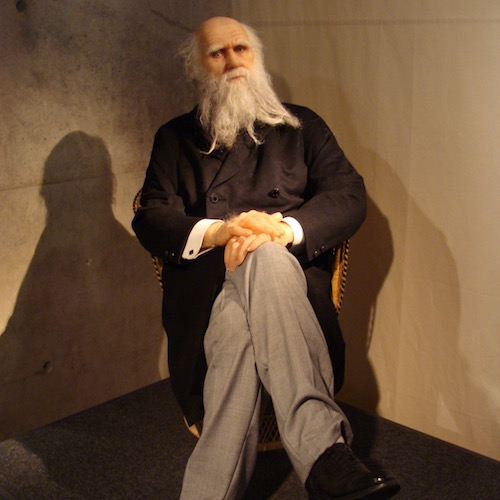 Education
Education
 Evolution
Evolution
 Faith & Science
Faith & Science
Was Darwinism Banned from Nazi Germany?

My new book, Hitler’s Religion: The Twisted Beliefs that Drove the Third Reich, is out today, so I know I am going to hear a refrain I’ve heard before when my earlier books were published: Darwinism (they will say) not only did not serve as an important component of Nazi ideology, but Darwinism was banned from Nazi Germany.
 This notion that Darwinism was banned in Nazi Germany is pretty widespread on blogs, especially those by atheists and freethinkers. For instance, a blog called Skeptical Science states emphatically: “Fact: Darwin’s books were banned in Nazi Germany, not endorsed.” A blogger on Patheos claimed that “the Nazis burned copies of the Origin of Species.” The famous atheist Christopher Hitchens once responded to a question about the link between Darwinism and Nazism by replying, “Darwin’s thought was not taught in Germany. Darwinism was derided in Germany, along with every other form of unbelief.” University of Chicago historian Robert Richards in his book, Was Hitler a Darwinian? agrees that Darwinism was persona non grata in Nazi Germany.
This notion that Darwinism was banned in Nazi Germany is pretty widespread on blogs, especially those by atheists and freethinkers. For instance, a blog called Skeptical Science states emphatically: “Fact: Darwin’s books were banned in Nazi Germany, not endorsed.” A blogger on Patheos claimed that “the Nazis burned copies of the Origin of Species.” The famous atheist Christopher Hitchens once responded to a question about the link between Darwinism and Nazism by replying, “Darwin’s thought was not taught in Germany. Darwinism was derided in Germany, along with every other form of unbelief.” University of Chicago historian Robert Richards in his book, Was Hitler a Darwinian? agrees that Darwinism was persona non grata in Nazi Germany.
If we want to know whether Darwinism was taught or banned in Nazi Germany, the logical place to start would be to look at the schools and universities. The Nazis were zealous about controlling the educational institutions, so they could inculcate their ideology into the minds of the youth.
What was in the official Nazi biology curriculum and the textbooks? As it turns out, the Nazi Ministry of Education published curricular guidelines in 1938, and the biology curriculum mandated extensive teaching about evolution. Further, the National Socialist Teachers’ League developed a biology curriculum in 1936-37. Of the ten major topics covered in the higher grades, one was biological evolution and another was human evolution. I have examined numerous biology textbooks published in Nazi Germany, which were approved by the Nazi Ministry of Education, and they uniformly taught Darwinian evolution, devoting considerable attention to it in the higher grades.
What about the universities? Were Darwinian biologists and anthropologists demoted or promoted there? Most biologists and anthropologists at German universities embraced Darwinism before the Nazis came to power, but the Nazi regime continued to appoint Darwinists to biology and anthropology professorships. Karl Astel, whom the Nazis appointed professor of human genetics and later promoted to rector (equivalent of president) of the University of Jena, was an avid Darwinist. He was also an SS officer who wanted to turn the University of Jena into a fully Nazified university. In order to accomplish this goal, he received Himmler’s help in recruiting the biologist and SS officer Gerhard Heberer as a professor of human evolution at the University of Jena. Nazis appointed many other Darwinian biologists and anthropologists to professorships, too.
If we examine the Nazi press, we find that the official Nazi newspaper, magazines, and journals occasionally published articles favorable to Darwinism. Der Biologe, the official journal for biology teachers, was taken over by the SS and regularly published articles promoting Darwinism and bashing creationism. One of these articles was by Konrad Lorenz, a later Nobel Prize winner, who argued that Darwinism was a firm basis for Nazi racial ideology. Articles against Darwinism were nowhere to be found in the Nazi press.
Where, then, did this myth of the Nazis banning Darwin arise? As with many myths, there is a small element of truth, but it was wrenched from its context and blown out of proportion. In 1935 a minor official overseeing the libraries of Saxony published an article in a journal for librarians, in which he recommended banning certain categories of books. One category was: “Works of worldview or biological character whose content is the superficial scientific enlightenment of a primitive Darwinism and monism (Haeckel and those emulating him, as well as Ostwald).” Note that the target was “primitive Darwinism and monism,” not Darwinism per se. Also, the only two authors mentioned were Ernst Haeckel and Wilhelm Ostwald, not Darwin nor any of the myriad of other Darwinists who continued to publish pro-Darwinian science books and articles throughout the Nazi period.
Worse yet for those who base their argument on this supposed “ban,” there is no evidence that this ban ever took place, despite this one article (by a low-level functionary in a relatively obscure journal). Indeed, other articles published later in the same journal approvingly reviewed books with heavy doses of Darwinism, so clearly Darwinism was not banned.
Not even Haeckel was banned in Nazi Germany. Indeed, some books lauding Haeckel were published in Germany during the Nazi period and received positive reviews in the Nazi press. In 1943, twenty-nine books by Haeckel published by five different publishers were still in print, including his two most important works, Natürliche Schöpfungsgeschichte (Natural History of Creation) and Welträtsel (Riddle of the Universe). Also, in 1941 Heberer and Astel formed the Ernst Haeckel Society and recruited professors from all over Germany to join. Before doing this, they asked the Nazi Gauleiter (district leader) Fritz Sauckel to be the honorary head. He consulted Martin Bormann and Alfred Rosenberg, both of whom gave him the green light. Apparently these high-ranking Nazis did not get the memo that Haeckel was banned.
Now, none of this proves that Hitler’s ideology relied on Darwinism. For that evidence, you should read my new book, Hitler’s Religion, which provides plenty of evidence that Hitler’s worldview was Darwinian. But the myth of the Nazis banning Darwin does show how desperate the counterarguments of my critics are.
Richard Weikart is professor of history at California State University, Stanislaus, Senior Fellow at Discovery Institute’s Center for Science & Culture, and author most recently of Hitler’s Religion and The Death of Humanity: And the Case for Life.
Photo: Charles Darwin from the “Darwin observador, Darwin naturalista” exhibition, CosmoCaixa, Barcelona, by Eduard Solà (Own work) [CC BY 3.0], via Wikimedia Commons.
